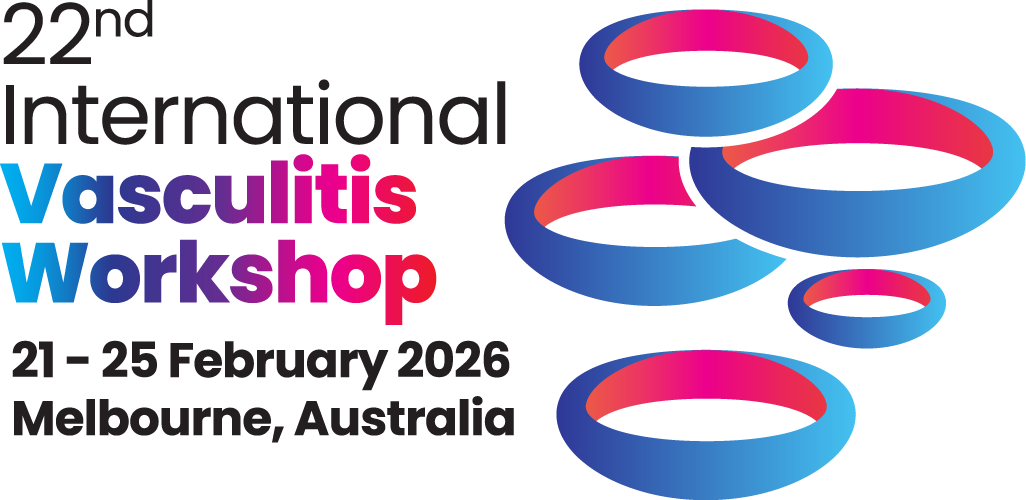The International Vasculitis Workshop welcomes Late Breaking Abstracts and is able to accommodate a very limited number within the program.
As the late breaking abstract deadline is not an extension of the regular submission deadline, criteria for acceptance differ.
- A late breaking abstract must contain new information that was not known or fully available by the regular abstract submission deadline.
- Clinical trial results will be prioritized.
- Due to the high number of Abstracts that we have already received, Oral Presentation opportunities are limited.
- The Workshop will endeavor to accommodate late-breaking abstracts within the program, but cannot guarantee that a late breaking abstract that is submitted will be accepted.
Presentation Types
Abstracts can be submitted for either of the presentation types below:
Oral Presentation
All oral presentations will be grouped into sessions throughout the Workshop. Further details about oral presentations will be sent to presenting authors after abstract review.
Posters
Poster presentations will be on display throughout the Workshop. Poster presenters will have the opportunity to present their poster and answer questions from delegates during the Workshop.
All Abstracts will be reviewed and assigned, based on scoring, to an Oral Presentation Session or to be presented as a Poster.
Abstract Themes
Authors are required to select a theme for their abstract submission. Themes are listed below.
1. Clinical Science
- 1.1 Epidemiology
- 1.2 Diagnosis and classification
- 1.3 Disease Assessment (including activity, response and damage)
- 1.4 Imaging
- 1.5 Organ-specific manifestations and management of specific situations
- 1.6 Treatment (including trials, observational data, current and new therapies)
- 1.7 Complications of Vasculitis
- 1.8 End-organ damage
- 1.9 Comorbidities and their management
- 1.10 Outcomes (including patient-reported outcomes)
- 1.11 Precision medicine approaches
- 1.12 Secondary vasculitis
- 1.13 Health systems and models of care
- 1.14 Case Series and Case Reports
2. Translational Science
- 2.1 Genetics and epigenetics
- 2.2 Vasculitis and environmental/acquired factors
- 2.3 Cellular and molecular mechanisms of disease: Adaptive immunity
- 2.4 Cellular and molecular mechanisms of disease: Innate immunity
- 2.5 Mechanisms of tissue injury
- 2.6 Mechanisms of tissue repair and fibrosis
- 2.7 Biomarkers
- 2.8 Emerging technologies and approaches (including AI)
3. Other
- 3.1 Educational Initiatives (including on-line tools and social media)
Abstract submissions will need to identify what type of vasculitis is included in their abstract. If the abstract includes more than one type of vasculitis, please indicate the main type or use “no specific disease”.
- 1 ANCA-associated vasculitis (GPA or MPA)
- 2 ANCA-associated vasculitis (EPGA)
- 3 Anti-GBM disease
- 4 IgA vasculitis
- 5 PAN
- 6 Kawasaki disease
- 7 GCA (includes PMR)
- 8 Takayasu’s arteritis
- 9 Behçet’s syndrome
- 10 Other forms of vasculitis (includes secondary vasculitis, cryoglobulinaemic vasculitis, primary CNS vasculitis, IgG4-RD, cutaneous small vessel vasculitis, hypocomplementaemic urticarial vasculitis, relapsing polychondritis, genetically associated vasculitides, vasculitis due to ADA2 deficiency, VEXAS syndrome)
- 11 No specific disease
Key Dates
| Call for late breaking abstracts open | 24 November 2025 |
| Call for late breaking abstracts close | 10 December 2025, 11:59pm AEDT |
| Notifications sent to presenters | 17 December 2025 |
Terms & Conditions
- There are no templates for abstracts. The submission format will be “type in the box” for the body of the abstract
- Authors can submit multiple abstracts
- Authors can nominate only one presenting author per abstract submission
- Abstracts must be a maximum of 300 words (excluding title, authors and affiliations)
- Abstract titles must be maximum of 25 words, be descriptive and not contain abbreviations
- Abstracts must be thoroughly checked for spelling and grammar before submission
- Abstracts may contain standard abbreviations (spelled out on first use)
- Abstracts may contain scientific symbols
- Abstracts must not contain figures or diagrams
- Abstracts should be submitted only in the English language
- Abstracts are required to use the following headings:
Background/Aims:
Methods:
Results:
Conclusions: - All authors listed on the abstract must approve of submitting their work for presentation
- The work within the Abstract must not have been published prior to Wednesday 10 December 2025
- At least one author needs to be available to present if selected and will be required to have registered for the workshop
- Only abstracts submitted via the abstract submission portal (linked above) will be considered
- All abstracts must be submitted by 23:59 (AEDT), 10 December 2025 to be considered
Enquiries
For all abstract enquiries, please contact the Secretariat.
